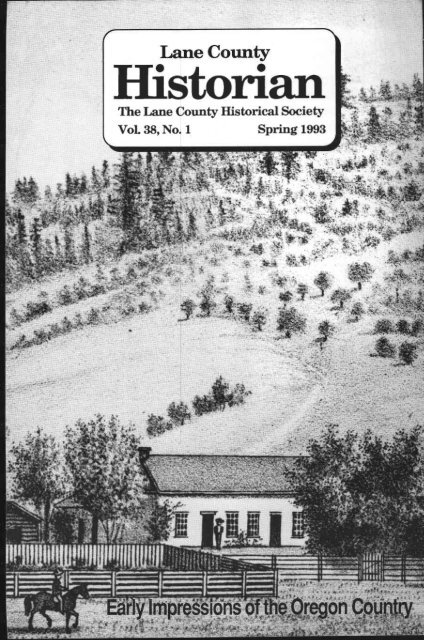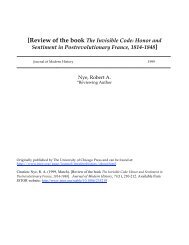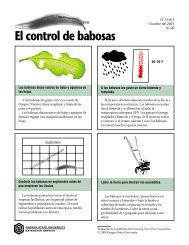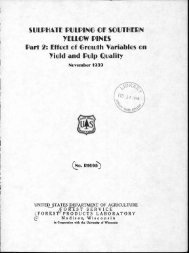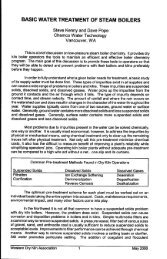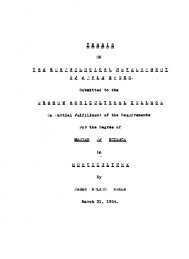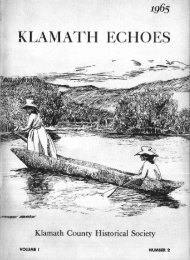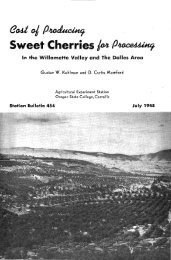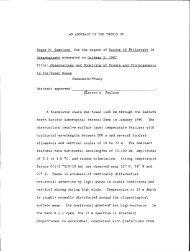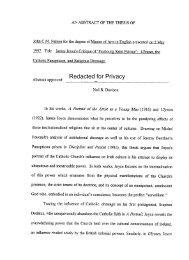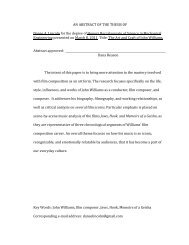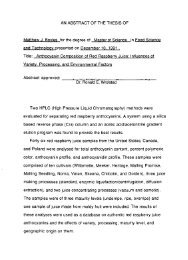i-li storian - ScholarsArchive at Oregon State University
i-li storian - ScholarsArchive at Oregon State University
i-li storian - ScholarsArchive at Oregon State University
Create successful ePaper yourself
Turn your PDF publications into a flip-book with our unique Google optimized e-Paper software.
-I--I-. I<br />
Lane County<br />
i-<strong>li</strong> <strong>storian</strong><br />
-<br />
The Lane County Historical Society<br />
VoL 38, No. 1 Spring 1993<br />
.e4iI 9RJ IL:<br />
Ear y. lmpressns of theregon Cpird<br />
-<br />
,', . 2<br />
b<br />
-
The Lane County Historical Society<br />
Ethan Newman, President, 2161 <strong>University</strong> Street, Eugene, OR 97403<br />
Alta Nelson, Membership Secretary: P0 BOX 11532, Eugene, OR 97440<br />
Lane County Hi<strong>storian</strong>, VoL 38, Number 1, Spring 1993<br />
Ken Metzler, Editor, 2051 East 26th Avenue, Eugene, OR 97403<br />
(Phone 343-4496)<br />
Janet Burg and Dorothy Corkery, Assistant Editors<br />
Lois Barton, Contributing Editor<br />
Contents<br />
Footnotes to history 1<br />
Voice from the past:a <strong>li</strong>ttle girl from Landax School, ca. 1905,<br />
speaks out. Biscuit making in the old days. Significant d<strong>at</strong>es<br />
in history. The first U. 0. students canoeing on the millrace.<br />
Settlers' first impressions of the promised land. 6<br />
They came, they saw, but did they <strong>li</strong>ke wh<strong>at</strong> they saw? Their<br />
diaries were remarkably silent. By turning to other sources,<br />
one observer pries loose some answers. By Marty West.<br />
Wil<strong>li</strong>am Tugman last of the crusading editors 16<br />
He was a Harvard-educ<strong>at</strong>ed student ofefficient government,<br />
and one of his first rules was th<strong>at</strong> officials should never<br />
conduct the pub<strong>li</strong>c's business in secret. By Dan Wyant.<br />
Cover<br />
Some ofour ear<strong>li</strong>est views ofLane County come via sketches<br />
in the 1884 book, An illustr<strong>at</strong>ed History of Lane County,<br />
pub<strong>li</strong>shed by A H. Wal<strong>li</strong>ng. This scene depicts the Jacob<br />
Spores residence, near Coburg. Wh<strong>at</strong> the country was <strong>li</strong>ke in<br />
the ear<strong>li</strong>est days, and wh<strong>at</strong> the pioneers thought ofit, is the<br />
topic of ourfe<strong>at</strong>ure, "Settlers' First Impressions. . ."page 6.<br />
ISSN 0458-7227
A compendium of items, historic or otherwise, about Lane County<br />
and vicinity. We hear from a student <strong>at</strong> the Landax School, 1905<br />
era. And we recount some of the names ofLane County<br />
landmarks, including the lake on top of the South Sister.<br />
About the <strong>li</strong>ttle girl with<br />
the staple in her tummy<br />
Last issue we ran a photo of about 20<br />
grammar school students in front of<br />
the primitive Landax<br />
School on a site now buried<br />
bene<strong>at</strong>h Lookout Point<br />
Reservoir. ["Life on Rush<br />
Island before the flood of<br />
'54," page 63].<br />
The d<strong>at</strong>e of the photo:<br />
about 1905just 13 years<br />
short of a century ago. We<br />
never dreamed, as we assembled<br />
the layout, th<strong>at</strong><br />
any of those young students<br />
would <strong>at</strong>tempt to<br />
get in touch with us.<br />
Yet something about<br />
the young faces appealed<br />
to us. They looked so earnest,<br />
so serious, so naive,<br />
sort of, peering <strong>at</strong> us from<br />
the wilderness th<strong>at</strong> was<br />
<strong>Oregon</strong> in 1905, <strong>li</strong>ttle suspecting<br />
th<strong>at</strong> where they<br />
stood would slumber bene<strong>at</strong>h<br />
deep w<strong>at</strong>er half a<br />
century l<strong>at</strong>er or th<strong>at</strong> their<br />
picture would run in a<br />
historicaljournal in apresumablymore<br />
sophistic<strong>at</strong>ed time of computers, s<strong>at</strong>el<strong>li</strong>tes,<br />
television, and McDonald's<br />
hamburgers.<br />
Spring 1993<br />
Footnotes to history<br />
Wh<strong>at</strong> interesting convers<strong>at</strong>ions<br />
could we have had if they could speak<br />
with us today? Wh<strong>at</strong> would they tell<br />
us about th<strong>at</strong> <strong>li</strong>ttle school and about<br />
their subsequent <strong>li</strong>ves?<br />
One day our phone rang. One of<br />
those youngsters, yes, one of those<br />
very same kids pictured in front of<br />
Landax School, came on the <strong>li</strong>ne.
"I'm the <strong>li</strong>ttle girl with the staple in<br />
her tummy," said the voice.<br />
The <strong>li</strong>ttle girl was now about 95<br />
years old. She spoke with a firm, husky<br />
voice, even as she admitted her memory<br />
of those school days had dimmed over<br />
time. She was in the first grade then.<br />
She's not sure, but she thinks she ar.<br />
rived <strong>at</strong> school each day by riding a<br />
horse. School lasted for only three<br />
months of the year. She cannot remember<br />
the name of her teacher. She<br />
spent only one three-month session <strong>at</strong><br />
Landax, l<strong>at</strong>er movingto Oakridge, then<br />
to Portland where she finished <strong>at</strong> Lincoln<br />
High School.<br />
Wh<strong>at</strong> she especially remembered<br />
about Landax School was noise and<br />
confusion. One-room schools tended to<br />
be th<strong>at</strong> wayeach class reciting lessons<br />
in earshot of students from other<br />
grades. It was hard for a first-grader<br />
to concentr<strong>at</strong>e, she remembered. But<br />
it was fun being <strong>li</strong>ttle because all of the<br />
bigger kids took care of you, sort of.<br />
Among the games they played outside<br />
during recess was "annie over": rol<strong>li</strong>ng<br />
a ball over the roof of the school to be<br />
caught by the team on the other side<br />
back and forth until the bell rang ending<br />
recess.<br />
The <strong>li</strong>ttle girl's name was Hal<strong>li</strong>e<br />
Hills. She came from pioneer stock.<br />
Her grandf<strong>at</strong>her, Corne<strong>li</strong>us Hills,<br />
crossed the plains to <strong>Oregon</strong> in 1847<br />
and again eastward in 1850, then back<br />
to <strong>Oregon</strong> with his bride in 1851. One<br />
of Corne<strong>li</strong>us' sons, Jasperfor whom<br />
the community of Jasper is named<br />
became Hal<strong>li</strong>e's f<strong>at</strong>her. Jasper had a<br />
firm commitment to educ<strong>at</strong>ion, and he<br />
insisted th<strong>at</strong> Hal<strong>li</strong>e <strong>at</strong>tend school regularly<br />
even when it would have been<br />
easy to drop out.<br />
2<br />
Hal<strong>li</strong>e Hills married a football hero<br />
who became prominent in business<br />
and pub<strong>li</strong>c affairs in Eugene. C. A.<br />
("Shy") Huntington played quarterback<br />
on the only <strong>University</strong> of <strong>Oregon</strong> football<br />
team ever to win a Rose Bowl game<br />
(1917). In 1920, as <strong>Oregon</strong> football<br />
coach, he took another team to the<br />
Rose Bowl where <strong>Oregon</strong> lost by one<br />
point.<br />
Urged on by her historical heritage,<br />
Hal<strong>li</strong>e Huntington has devoted a <strong>li</strong>fetime<br />
to the study and dissemin<strong>at</strong>ion of<br />
Lane County history. She served for a<br />
time as president of the Lane County<br />
Historical Society, and she continues<br />
to serve on its board of directors. She<br />
has written for the Lane County Hi<strong>storian</strong><br />
and elsewhere not only about<br />
her grandf<strong>at</strong>her's three crossings of<br />
the plains, but about numerous other<br />
elements of local history.<br />
Quotable Quotes in history<br />
"Wh<strong>at</strong> a pleasant hill! This is my<br />
claim."E<strong>li</strong>jah Bristow in 1846 upon<br />
observing the knoll, not far from the<br />
Willamette River, th<strong>at</strong> we now know<br />
as Pleasant Hill.<br />
Wh<strong>at</strong>'s in a nzme?<br />
Clearly the hallmark of any Lane<br />
County outdoorsman is the abi<strong>li</strong>ty to<br />
bake biscuits under primitive conditions<br />
outdoors. History records th<strong>at</strong><br />
not all <strong>at</strong>tempts were successful. Two<br />
were so spectacularly unsuccessful th<strong>at</strong><br />
the incidents are preserved in the<br />
names of landmarks. One is "Sinker<br />
Mountain" above Fall Creek, so named<br />
when some hunters were forced to e<strong>at</strong><br />
less-than-savory biscuits made with<br />
Lane County Hi<strong>storian</strong>
soda, popularly known as sinkers. The<br />
other is "De<strong>at</strong>hball Rock" above the<br />
McKenzie River near Blue River, so<br />
named after another biscuit fiasco.<br />
(From <strong>Oregon</strong> Geographic Names, by<br />
Lewis L. McArthur, 6th ed., 1992.)<br />
Sometime in the earlyyears, Mrs. Lewis<br />
Martin and her husband sold a cow to<br />
purchase enough silk fabric to make a<br />
dress. Unfortun<strong>at</strong>ely, upon their return<br />
home theyhad to drive their wagon<br />
across a rain-swollen creek th<strong>at</strong> empties<br />
into the coastfork ofthe Willamette<br />
River by Cottage Grove. The swift<br />
w<strong>at</strong>ers jostled the wagon and the parcel<br />
of silk fell off and washed downstream,<br />
irretrievably lost. The stream<br />
thereafterbecame known as Silk Creek.<br />
(From Golden Was the Past.)<br />
<strong>Oregon</strong> has a second cr<strong>at</strong>er lake, the<br />
highest lake in <strong>Oregon</strong>, near the summit<br />
of the South Sister in the southeast<br />
corner of Lane County. In 1969 the<br />
noted <strong>Oregon</strong> photographer David<br />
Falconer and his family c<strong>li</strong>mbed to the<br />
top of the mountain. The family included<br />
three young Falconer girls,<br />
E<strong>li</strong>zabeth, P<strong>at</strong>ricia, and Peggy. The<br />
girls inquired about the name of the<br />
lake. Apparentlyithad no name. They<br />
suggested "Teardrop Pool" to the <strong>Oregon</strong><br />
Geographic Names Board, and<br />
the name was duly approved. (<strong>Oregon</strong><br />
Geographic Names.)<br />
Significant d<strong>at</strong>es in<br />
Lane County history<br />
1778. In March, Captain James Cook<br />
sailed along the <strong>Oregon</strong> Coast; he<br />
claimed to see snow along the coast.<br />
He observed in his log th<strong>at</strong> while the<br />
Spring 1993<br />
area might be a pleasant summer<br />
prospect, it now had r<strong>at</strong>her a disagreeable<br />
aspect. He may have<br />
mistaken for snow the sand dunes<br />
th<strong>at</strong> extend along the coast in wh<strong>at</strong><br />
weknowas Lane, Douglas, and Coos<br />
Counties. Equally disagreeable to<br />
Cook was the <strong>Oregon</strong> we<strong>at</strong>her,<br />
prompting him to <strong>at</strong>tach the name<br />
"Cape Foul We<strong>at</strong>her" to a headland<br />
on the central coast.<br />
1847. Mary Skinner joined her husband<br />
in Eugene, the community's<br />
first non-n<strong>at</strong>ive woman resident.<br />
1848. Leonora C Skinner became the<br />
first non-n<strong>at</strong>ive child born in the<br />
Eugene area, daughter of Eugene F.<br />
and Mary Skinner.<br />
1849. A lot of Eugene residents left for<br />
the Ca<strong>li</strong>fornia gold rush with resultant<br />
popul<strong>at</strong>ion loss. But not<br />
Hilyard Shawhe took up a don<strong>at</strong>ion<br />
land claim where the U. of 0.<br />
now stands, built a cabin bene<strong>at</strong>h<br />
the Condon Oaks where he conceived<br />
a pretty good idea: connect two<br />
sloughs with the Willamette River<br />
to form a millrace to provide industrial<br />
power.<br />
1850. First Eugene post office opened<br />
in Eugene Skinner's home.<br />
1850. Lane County's first church estab<strong>li</strong>shed<br />
<strong>at</strong> Pleasant Hill.<br />
1852. Eugene popul<strong>at</strong>ion reached 40.<br />
Hilyard Shaw completed the millrace<br />
and built a sawmill.<br />
1853. Methodist Church, first church<br />
in Eugene, built <strong>at</strong> 10th and<br />
Willamette.<br />
1864. Eugene adopted its first city<br />
charter and elected Eugene Skinner<br />
mayor.<br />
1876. Ferry Street Bridge built.<br />
1894. Heceta Head <strong>li</strong>ghthouse began
oper<strong>at</strong>ion.<br />
1904. An automobile caine to Eugene,<br />
its first.<br />
1906. Total automobile count in Eugene:<br />
4.<br />
1908. Florence's first Rhododendron<br />
Festival.<br />
1912. Sisters of Mercy opened "Mercy<br />
Hospital and Nurses Training<br />
School," l<strong>at</strong>erknown as Sacred Heart<br />
Hospital.<br />
1927. Eugene's first commercial radio<br />
st<strong>at</strong>ion, KORE, began broadcasting.<br />
1934. Massive tree planting campaign<br />
on Skinner Butte.<br />
1937. "Save Spencer Butte" group<br />
formed to forestall logging of the<br />
butte.<br />
1956. Vol. 1, No. 1 of Lane County<br />
Hi<strong>storian</strong>. Contents included a directory<br />
of members with account of<br />
their pioneer heritage. The 110<br />
members on the <strong>li</strong>st cited 89 ancestors<br />
who had arrived in <strong>Oregon</strong> via<br />
pioneer wagon trails.<br />
Canoeing <strong>at</strong> <strong>Oregon</strong><br />
By E<strong>li</strong>zabeth Lewis, U.O. Class of 1913<br />
Reprinted from <strong>Oregon</strong> Monthly,<br />
U.O. student magazine, May 1911<br />
Canoeing, which is one of the most<br />
distinctive and popular of all <strong>Oregon</strong>'s<br />
out-door activities and pastimes, is not,<br />
contrary to the general opinion, a timehonored<br />
institution which has existed<br />
since the founding of the <strong>University</strong> in<br />
1871. Those old grads of the '70s and<br />
'80s completed their college educ<strong>at</strong>ion<br />
without a course in padd<strong>li</strong>ng or a course<br />
in preparing Sunday morning breakfasts<br />
in some sheltered nook "up the<br />
race"; they never knew the joy of a<br />
sudden and unexpected plunge to the<br />
4<br />
bottom, the fun in fishing yourselves,<br />
pillows, and rugs out, of righting your<br />
canoe again, and of sneaking home<br />
under the conveniently overhanging<br />
branches and shrubs and thence up a<br />
back street, in the back door, and up to<br />
your room for much needed repairs.<br />
Although the millrace has been here<br />
since early in the '80s, and the<br />
Willamette has always flowed past the<br />
campus, canoeing was an unknown<br />
and untried joy until the spring of<br />
1907. Until then the college students<br />
were contented to row about in fl<strong>at</strong>bottomed<br />
skiffs and rowbo<strong>at</strong>s, or enjoyed<br />
the beauties of the race and river<br />
from the banks, or from Lover's Lane,<br />
the only walk running between the<br />
two. However, there were a few students<br />
in the <strong>University</strong> in the spring of<br />
1907 who were less easily s<strong>at</strong>isfied<br />
than their fellow students with the use<br />
made of the race, and who were capable<br />
of appreci<strong>at</strong>ing the extraordinary<br />
possibi<strong>li</strong>ties which it possessed<br />
for canoeing. Three of those varsity<br />
men built canoesfor themselvesLloyd<br />
Mott, Warner, and Eltonwhile Billy<br />
Huggins had a Racine shipped to him<br />
from Portland. Itisnotknown whether<br />
these canoes were started upon their<br />
initial trips with the due pomp and<br />
ceremony which was fitting to the introduction<br />
of so important an institution,<br />
but it is certain th<strong>at</strong> four more<br />
popular and envied men never <strong>at</strong>tended<br />
<strong>Oregon</strong>. For some time these four<br />
canoes were the only ones upon the<br />
race, but others soon made their appearance<br />
until now, only five years<br />
l<strong>at</strong>er, there is scarcely a college man<br />
who is not an adept paddler, and, indeed,<br />
many of the Co-eds manage their<br />
canoes with remarkable skill and dex-<br />
Lane County Hi<strong>storian</strong>
The Eugene millrace circa 1908 before canoes became common. The primary<br />
vehüle then was the fl<strong>at</strong>-bottomed rowbo<strong>at</strong>, as seen here <strong>at</strong> McClanahan 's<br />
Landing. Mr. McClanahan is <strong>at</strong> left, and the young u'oman in the photo,<br />
Pearl LaPorte, eventually became the mother of Don Hunter, of Eugene,<br />
famed for his audio-s<strong>li</strong>de present<strong>at</strong>ions. (Photo: U. 0. Archives.)<br />
terity, holding their own with anyone.<br />
From four, the number has increased<br />
to nearly 100 belonging to various college<br />
students, faculty members, fr<strong>at</strong>ernities,<br />
and bo<strong>at</strong>-houses.<br />
Mixups and other<br />
misdemeanors<br />
Ourfall issue, the one showing Mahlon<br />
Sweet cruising along a muddy road in<br />
1911, had a few problems. Because of<br />
Spring 1993<br />
an error <strong>at</strong> the print shop, some of the<br />
pages got mixed up in a few of the<br />
copiesnotmany, just enough to bring<br />
requests for "clean" copies, which we<br />
sent promptly. If anyone else has a<br />
copy with mixed up pages, please let us<br />
know and we'll send another. Also,<br />
Carl Stevens, ofWalterville, advises us<br />
th<strong>at</strong> the Eugene Farmer's Cooper<strong>at</strong>ive<br />
driver identified as Dan Warrant (page<br />
67) should have read Dan Warnock, as<br />
Carl knew the driver personally.<br />
5
Settlers' first impressions<br />
of the promised land<br />
They dreamed about the new land; they endured enormous<br />
hardships crossing the plains to <strong>Oregon</strong>. Wh<strong>at</strong> did they think and<br />
feel once they arrived? They were too busy to say much.<br />
Carving a civi<strong>li</strong>z<strong>at</strong>ion out of the wilderness. Lane County's<br />
first house, built by E<strong>li</strong>jah Bristow <strong>at</strong> Pleasant Hill<br />
sometime after his arrival in 1846, is depicted in sketch<br />
below in the Wal<strong>li</strong>ng history, pub<strong>li</strong>shed in 1884.
i<strong>storian</strong>s have plenty of<br />
m<strong>at</strong>erialcountlesstrail<br />
diaries and personal recollections<strong>at</strong>handwhen<br />
describing the adventures<br />
of pioneers crossing the plains<br />
along the <strong>Oregon</strong> Trail. But we don't<br />
have many original sources to tell us<br />
wh<strong>at</strong> the immigrants did when they<br />
reached this "promised land" of <strong>Oregon</strong>.<br />
Fewer still give candid observ<strong>at</strong>ions<br />
of how the immigrants felt when,<br />
after months of arduous travel, they<br />
viewed Western <strong>Oregon</strong> for the first<br />
time.<br />
Good reasons exist for this paucity<br />
of m<strong>at</strong>erial. The immigrants were too<br />
busy preparing to face their first Or-<br />
egon winter. They had no time to<br />
record their first impressions.<br />
Yet I was curious to know if this<br />
promised land met their expect<strong>at</strong>ions.<br />
Were the skills they brought useful in<br />
their new surroundings? Wh<strong>at</strong> was<br />
most important in their <strong>li</strong>ves <strong>at</strong> the<br />
time?<br />
In a search for the answers,! loc<strong>at</strong>ed<br />
five good sources:<br />
Personal recollections.<br />
Correspondence kept as family<br />
treasures.<br />
Pub<strong>li</strong>shed biographies and compil<strong>at</strong>ions<br />
such as Wal<strong>li</strong>ng and Bancroft.<br />
Newspaper c<strong>li</strong>ppings.<br />
Most interesting of all, "Transactions<br />
of <strong>Oregon</strong> Pioneer Associ<strong>at</strong>ion," a<br />
r$b
P<br />
pub<strong>li</strong>shed account of a pioneer society<br />
begun in 1873 to collect from <strong>li</strong>ving<br />
witnesses the available facts and impressions<br />
of <strong>Oregon</strong> pioneer <strong>li</strong>fe.<br />
For this study, I selected arepresent<strong>at</strong>ive<br />
group of settlers who arrived in<br />
the Willamette Valley between 1845<br />
and 1860.<br />
One example is Wil<strong>li</strong>am Wil<strong>li</strong>s Cooke<br />
who wrote to his parents in North<br />
Caro<strong>li</strong>na after his arrival in 1852.<br />
Dear F<strong>at</strong>her and Mother:<br />
I embrace the present opportunity to<br />
write you a few <strong>li</strong>nes to let you know<br />
where we are and wh<strong>at</strong> we are doing.<br />
We are in <strong>Oregon</strong> near a <strong>li</strong>ttle town<br />
called Champoeg about 25 miles above<br />
<strong>Oregon</strong> City on the Willamette River.<br />
lam well pleased with this countly<br />
so far aslhave seen... the land is vely<br />
rich. The mountains are all heavy<br />
timbered from the smallest twigtothree<br />
hundred feet high. The largest one I<br />
have hea rd of measured 45 feet around.<br />
The timber is fir, oak and cedar, the<br />
cedargrows very large and thick. I have<br />
seen it 25 feet round <strong>at</strong> the stump.<br />
In many places the timber is so large<br />
and thick th<strong>at</strong> it would be almost impossible<br />
to make a farm... Where the<br />
timber is not so thick the hazel is so<br />
thick as it can stand.. . about as high as<br />
a man's head. Some of the hazel grows<br />
large enough for hand spikes, ax<br />
handles, bows and about as tough as<br />
hickory.<br />
To tell you of my losses on the plains,<br />
I lost 4 head of steers, 3 head of cows<br />
and 1 horse. . . .1 threw away one bed..<br />
8<br />
.When a man starts this trip he may<br />
expect to lose halfofall he has. Ifhe gets<br />
through a<strong>li</strong>ve, he does well.<br />
A second letter:<br />
I forgot to tell you about the c<strong>li</strong>m<strong>at</strong>e...<br />
it rains here all winter. Stock need no<br />
feed in this country. . . f<strong>at</strong>ten hogs on<br />
whe<strong>at</strong>.. . but hogs is scarce.<br />
Then a week l<strong>at</strong>er:<br />
We had some bad luck since we got in.<br />
our <strong>li</strong>ttle baby th<strong>at</strong> was born in the<br />
Um<strong>at</strong>illa died. It died on the 8th of<br />
October. It was never well. P<strong>at</strong>sy got a<br />
fall from a horse in Grande Ronde<br />
which hurt her very much. I thought<br />
this was the cause of its de<strong>at</strong>h.<br />
Weare well<strong>at</strong>present.. . the children<br />
are all fine and f<strong>at</strong>. P<strong>at</strong>sy's health is<br />
very good <strong>at</strong> present. She isjust getting<br />
over sore eyes. She was nearly b<strong>li</strong>nd <strong>at</strong><br />
one time. I forgot to tell you our <strong>li</strong>ttle<br />
baby's name th<strong>at</strong> died was Leah<br />
Arabella. Tell Mother we named it<br />
after her and Aunt Arabella.<br />
The documents of pioneer struggles<br />
suggest th<strong>at</strong> time was important to the<br />
settlers. Their initial task was a race<br />
against the onslaught of winterto<br />
select their land, build shelters, and<br />
stockprovisions. With time so precious,<br />
few pioneers wrote diaries during this<br />
period of sett<strong>li</strong>ng in. But, fortun<strong>at</strong>ely,<br />
a <strong>li</strong>ttle l<strong>at</strong>er, when circumstances permitted,<br />
some took moments to reflect<br />
on those initial activities.<br />
Author Marty West is cur<strong>at</strong>or of special collections <strong>at</strong> the Lane County Historical<br />
Museum Library. This article is adapted from a speech she gave to the Lane<br />
County Historical Society last year.<br />
Lane County Hi<strong>storian</strong>
The Bristow house, shown years<br />
after the scene sketched on pages<br />
six and seven, shows ElUah<br />
Bristow 's grandson, Wil<strong>li</strong>am L.<br />
Bristow, and the l<strong>at</strong>ter's son, Arlo.<br />
One such account was written by<br />
John L. Wigle whose party came from<br />
Il<strong>li</strong>nois and settled in Linn County in<br />
1852. They came via the Columbia<br />
River, stopping briefly <strong>at</strong> Vancouver<br />
and <strong>Oregon</strong> City. There they stayed<br />
with an uncle and sought medical<br />
tre<strong>at</strong>ment for John's sister who was ill<br />
from a "mountain fever" epidemic th<strong>at</strong><br />
had caused several de<strong>at</strong>hs on the trail.<br />
As they waited, some of the party proceeded<br />
down the valley to find land and<br />
build shelter. John described the trip<br />
south from <strong>Oregon</strong> City to near<br />
Brownsville:<br />
Leaving Uncle Joe Hunsaker's we had<br />
yet forty miles to travel. The roads were<br />
very muddy and it required two days<br />
drive to make th<strong>at</strong> distance. . . .The next<br />
day we went to the place th<strong>at</strong> they had<br />
selected about six miles distance. They<br />
had hauled logs from the mountains<br />
three miles east and built a log house.<br />
Spring 1993<br />
Then came the rains. When lowland<br />
floodw<strong>at</strong>ers lapped <strong>at</strong> the doorstep, they<br />
struck out for a homesite near Muddy<br />
Creek. But an "old bachelor" had<br />
squ<strong>at</strong>ted unwelcome on their claim:<br />
He could not be peaceably induced to<br />
abandon it, so in preference to trouble<br />
with him, f<strong>at</strong>her decided to quit the<br />
place.<br />
Work on homesite Three began about a<br />
mile north offlarrisburg. Twelve inches<br />
of snow subsequently fell, but by then<br />
the new house was ready. From here<br />
they could look over <strong>at</strong> the mountains<br />
and see the oxen feeding on the green<br />
grass. But they discovered another<br />
problem:<br />
All the valley between them and us was<br />
<strong>li</strong>terally plowed up by the mice and<br />
gophers, and there was no grass in the<br />
valley, and so we had to leave the stock<br />
<strong>at</strong> the mountains. .. . Because of there<br />
being no grass and it being plentiful <strong>at</strong><br />
the hills and green all the winter, we<br />
hitched upourhorses, and having <strong>li</strong>ved<br />
in our brand new house only four days,<br />
we pulled out from it to hunt a home<br />
nearer the hills.<br />
Theyboughthouse Fourfrom the same<br />
"old bachelor" who had squ<strong>at</strong>ted on the<br />
claim by Muddy Creek. For $200 they<br />
secured a one-room log cabin. All seven<br />
members of the family moved into it in<br />
mid-January.<br />
Despite such travails, the pioneers<br />
claimed to love their new homeland.<br />
Th<strong>at</strong> is a common thread running<br />
through most of the recollections<strong>at</strong><br />
least those written by men. Many were
Shortly after sett<strong>li</strong>ng in, <strong>Oregon</strong> pioneers developed primitive schools, of which<br />
this is typical. Scene was near present-day Westfir in 1903. Building<br />
eventually burned down. (Photos from Lane County Historical Museum.)<br />
ecst<strong>at</strong>ic. John Wigle's reaction was<br />
typical:<br />
We are now once more in aplace th<strong>at</strong> we<br />
call home, a place where the land is as<br />
free as the air we bre<strong>at</strong>he. Oh! Wh<strong>at</strong> a<br />
home it is in this <strong>Oregon</strong> we have come<br />
to. We have a wide, wide prairie, not a<br />
tree of any kind growing upon it, no<br />
semblance of any fence of any kind<br />
within a mile of it.<br />
Women's reactions to the new land<br />
seemed more guarded. In 1895 Mrs.<br />
Robert Miller, giving a speech to a<br />
group of pioneers, posed the question,<br />
why did women come to <strong>Oregon</strong>?<br />
Women came because men came. While<br />
10<br />
many women were enthusiastic to undertake<br />
the journey, the majority came<br />
inobediencetoman'sjudgment, whether<br />
or not in accord with her own. She<br />
came for love's sweet sake and the heroic<br />
desire to be helpm<strong>at</strong>e to her husband,<br />
wh<strong>at</strong>ever his ambition.<br />
She left the security of family and<br />
friends, estab<strong>li</strong>shed schools and<br />
churches and her social groups. She<br />
was expecting many changes, but she<br />
was <strong>li</strong>ttle prepared for the immedi<strong>at</strong>e<br />
disappointments and fears and<br />
longings. Her fee<strong>li</strong>ngs were most often<br />
kept hidden as she firmly adhered to<br />
her purpose.<br />
Women had already overcome adversity<br />
of the arduous trip west. It took<br />
Lane County Hi<strong>storian</strong>
another adjustment to adapt to<br />
<strong>Oregon</strong>'s rain and constant overcast<br />
skies while awaiting construction of a<br />
first home, which was rarely more than<br />
14 feet square. And it was lonely<br />
seldom closer than three miles from<br />
the nearest neighbor. The house contained<br />
a puncheon floor and a mud<br />
chimney. The space between logs was<br />
stuffed with clay to keep the elements<br />
out. It had no pane of glass or sawed<br />
lumber. Furniture often consisted of<br />
articles hewed from fir trees with an<br />
ax.<br />
The homemaker soon discovered<br />
th<strong>at</strong> unannounced houseguests were<br />
part of pioneer <strong>li</strong>fe. The guests were<br />
entertained in a single room th<strong>at</strong> was<br />
combined kitchen, bedroom, dining<br />
room, and parlor. Guests customarily<br />
brought their own blankets and slept<br />
on the floor with the children. Often<br />
the guests were circuit ridersjudges<br />
or preachers.<br />
Women's accounts of pioneer times<br />
Pioneer circuit riderthis is the Rev.<br />
Driver, Methodist ministerprovided<br />
"connection to God," and often was<br />
unannounced company.<br />
were often dram<strong>at</strong>ic and personal. Mrs.<br />
Miller said:<br />
Some women came to the end of their<br />
journey bereft ofall th<strong>at</strong> <strong>li</strong>fe holds dear;<br />
some so worn by sickness and care and<br />
the tedium of the trip they had no heart<br />
to begin <strong>li</strong>fe anew, and in sheer despair<br />
lay down and died; some cursed their<br />
f<strong>at</strong>e, some prayed for help; some looked<br />
back over the de<strong>at</strong>h-strewn p<strong>at</strong>h and<br />
wept from day to day. Others dipped<br />
into the future as far as human eye<br />
could see and looked beyond the mists<br />
and clouds, caught a g<strong>li</strong>mpse of the sun<br />
shining, and by th<strong>at</strong> vision were made<br />
ready to meet <strong>li</strong>fe grandly.<br />
Looking beyond the mists was a challenge.<br />
<strong>Oregon</strong>'s rain was a nuisance to<br />
the settlers, and 1862 was a particularly<br />
bad year. Ju<strong>li</strong>a Rickard Travers writes<br />
about her f<strong>at</strong>her's problems th<strong>at</strong> year<br />
on a farm near Monroe:<br />
F<strong>at</strong>her raised grain which he fed to<br />
stock, principally hogs. He built a log<br />
smokehouse and used to fill it with<br />
hams and bacon <strong>at</strong> butchering time.<br />
F<strong>at</strong>her had already taken several loads<br />
of ham and bacon to Portland and was<br />
about ready to butcheranotherlot when<br />
the flood came. His hogs were carried<br />
away, and about sisty of them landed<br />
a<strong>li</strong>ve on Winkle Butto and were recovered.<br />
Most of the herd, however, were<br />
drowned.<br />
Even as the pioneers settled in, everyday<br />
<strong>li</strong>fe remained a struggle, as John<br />
Wigle's account points out:<br />
There were no factories, no pub<strong>li</strong>c improvements<br />
and consequently most ev-<br />
Spring 1993 11
erything was homemade. The carding<br />
machine was miles away, bui the good<br />
housekeeper could manage to buy or<br />
bormw some hand cards and do her<br />
own carding. Those skilled in carpentry<br />
could rnakeaspinningwheelandby<br />
such means, with the help of the knitting<br />
needle, socks were made and most<br />
of the winter clothing home made.<br />
The grainfields of whe<strong>at</strong> and o<strong>at</strong>s<br />
could and did supply all our needs for<br />
headwear, even to our Sunday h<strong>at</strong>s.<br />
The ladies m.ade their own sun bonnets,<br />
and they looked as becoming as the<br />
work baskets do on the ladies heads<br />
today.<br />
Most recollections touched on farmmg.<br />
One account of a train of 99 wagons<br />
cited wh<strong>at</strong> may have been the<br />
grandest agricultural undertaking of<br />
all. In th<strong>at</strong> 1847 train, one Henderson<br />
Luel<strong>li</strong>ng brought pear, cherry, plum,<br />
and apple seed<strong>li</strong>ngs in his "trave<strong>li</strong>ng<br />
In Lane County, the land was wrested from timbered slopes and valleys,<br />
homes and barns built, with tidy farms gradually emerging. The Wal<strong>li</strong>ng<br />
sketch below depicts farm residence of George Mil<strong>li</strong>can <strong>at</strong> Walterville, 1880s.
nursery." The episode was recounted<br />
by Ralph C. Geer of Marion County:<br />
[Mr. Luel<strong>li</strong>ng] made two boxes 12<br />
inches deep and just wide enough and<br />
long enough to fill the wagon bed and<br />
filled them with a compost consisting<br />
principally of charcoal and earth into<br />
which he planted about 700 trees and<br />
shrubs from 20 inches to four feet high.<br />
This was a very hazardous undertaking<br />
as it was an extremely heavy load.<br />
This load of trees was the mother of<br />
all our early nurseries and orchards<br />
and gave <strong>Oregon</strong> a name and fame th<strong>at</strong><br />
she never would have had without it.<br />
Some pioneers took unusual pains<br />
sett<strong>li</strong>ng in. One was Corne<strong>li</strong>us Joel<br />
Hills, who came to Lane County in<br />
1847 via the Appleg<strong>at</strong>e Trail and settled<br />
on a don<strong>at</strong>ion land claim on the Middle<br />
Fork of the Willamette River. He spent<br />
the winter building a log cabin and<br />
making it as <strong>li</strong>vable as possible.<br />
In 1849 he took two horses and set<br />
out for the gold fields of Ca<strong>li</strong>fornia.<br />
Family accounts report th<strong>at</strong> he walked<br />
alongthe Fe<strong>at</strong>herRiverbed and picked<br />
up gold nuggets with a kitchen spoon<br />
worth $150 to $300 a day. By spring he<br />
had a sizable stake. In San Francisco<br />
he purchased farm machinery, including<br />
a plow, mower, rake, <strong>li</strong>ght farm<br />
wagons, harness, and a set of<br />
carpenter's tools. He booked passage<br />
Spring 1993 13
to Portland on a small sai<strong>li</strong>ng vessel,<br />
the Hackstaff, and carefully stowed his<br />
purchases aboard.<br />
Unfortun<strong>at</strong>ely, the vessel ran<br />
aground on a sand bar <strong>at</strong> the mouth of<br />
the Rogue River. Passengers had to<br />
abandon their possessions and strike<br />
outtoward the <strong>Oregon</strong>-Ca<strong>li</strong>fornia trail.<br />
After 24 days of near-starv<strong>at</strong>ion, the<br />
group reached the trail where it found<br />
help.<br />
Hills returned to <strong>Oregon</strong>, fenced in<br />
his property, and recrossed the plains<br />
eastward in the spring. He married<br />
Sephronia Briggs, and in 1851<br />
Corne<strong>li</strong>us and members of the Hills<br />
and Briggs fami<strong>li</strong>es returned to <strong>Oregon</strong>,<br />
sett<strong>li</strong>ng in to b<strong>li</strong>ssful domesticity<br />
among the Indians.<br />
Another name of note to us in Lane<br />
County is th<strong>at</strong> of Francis Marion<br />
Wilkins He tells us in his recollections<br />
th<strong>at</strong><br />
In 1849 the discovery ofgold inCa<strong>li</strong>fornia<br />
drove every able bodied man the<br />
land round on a frenzied hunt for gold,<br />
leaving women and children <strong>at</strong> home<br />
alone. My f<strong>at</strong>her, Mitchell Wilkins,<br />
was one who took the trail south to the<br />
mines. He left my mother with two<br />
babies. With them was a boy ofl4to get<br />
on as best they could with the manyjobs<br />
on the farm. F<strong>at</strong>her discovered a hole<br />
just in the edge of the w<strong>at</strong>er of the<br />
Trinity River and took out nearly eight<br />
hundred dollars in nuggets. This laid<br />
the found<strong>at</strong>ion for getting some stock<br />
c<strong>at</strong>tle, and by 1854 he was able to plan<br />
for building a better home.<br />
From such precarious beginnings, <strong>li</strong>fe<br />
got better. Francis Wilkins, for example,<br />
left the farm to go to business<br />
14<br />
college in Portland. He l<strong>at</strong>er owned his<br />
own pharmacyreputed to be the best<br />
in Eugene. Active in civic affairs, he<br />
helped beautify the community<br />
planting trees on Skinner Butte and<br />
estab<strong>li</strong>shing a park system, notably<br />
Hendricks Park, in Eugene.<br />
Primitive schools soon followed the<br />
sett<strong>li</strong>ng-in period. Wilkins'firsteduc<strong>at</strong>ion<br />
was in the local schoolhouse on his<br />
f<strong>at</strong>her's claim. Early residents pushed<br />
for schools, and as early as September<br />
1849 the Common School Law was<br />
passed permitting counties to be divided<br />
into pub<strong>li</strong>c school districts authorized<br />
to levy a 2-mill tax.<br />
The first school in Eugene was in a<br />
farm house of Fielden McMurray in a<br />
locale now occupied by the <strong>University</strong><br />
of<strong>Oregon</strong>. Miss Sarah Ann Moore, her<br />
salary paid by student tuition, came<br />
daily by horseback from Goshen to<br />
teach in this priv<strong>at</strong>e school. All kinds<br />
of priv<strong>at</strong>e schools flourished, languished,<br />
and decayed: grammar<br />
schools, select schools, academies,<br />
singing schools. The schools served as<br />
hubs of the settlements. John Wigle<br />
tells us of activities besides the spel<strong>li</strong>ng<br />
bees:<br />
We often heard the pioneer preachers.<br />
Among these were Rev. Wilson Blame,<br />
Rev. Robert Robe, Elders T. F. Campbell<br />
and Mulkey and H. H. Spaulding.<br />
The school being a free house we heard<br />
them all. And the po<strong>li</strong>ticians would<br />
sometimes come our way to air themselves<br />
with <strong>li</strong>ttle shows oftrickery. Here<br />
we heard the question ofst<strong>at</strong>ehood for<br />
<strong>Oregon</strong> Territory discussed.. . . Most<br />
anything and everything th<strong>at</strong> came<br />
alongwas welcoined <strong>at</strong>the school house.<br />
Lane County Hi<strong>storian</strong>
Sketch shows the A. D. Hyland<br />
stock ranch, vicinity of Lowell.<br />
Re<strong>li</strong>gion was equally vital. Trail<br />
diaries tell how important their faith<br />
was for the travelers. Conditions had<br />
not always allowed even the most devout<br />
to observe the Sabb<strong>at</strong>h. Even<br />
after their arrival in the valley the<br />
immedi<strong>at</strong>e necessities of <strong>li</strong>feshelter<br />
and foodpostponed their re<strong>li</strong>gious<br />
activities. Yet as one expressed it, the<br />
need for a "genuine connection to God"<br />
by way of an "official ministe? was<br />
gre<strong>at</strong>. The circuit ridera minister on<br />
horseback or wagon who often covered<br />
75 miles squaremet these needs.<br />
My examin<strong>at</strong>ion of such m<strong>at</strong>ters left<br />
me gr<strong>at</strong>eful for the personal accounts<br />
th<strong>at</strong> tell us things not written in the<br />
history books. Bless those settlers for<br />
taking time to record their recollections.<br />
From them I formed three conclusions.<br />
The pioneers were gr<strong>at</strong>eful for the<br />
beauty and bounty of the Willamette<br />
Valley.<br />
They accepted the conditions set<br />
upon them in a rugged and untried<br />
land.<br />
They were determined to overcome<br />
all obstacles in order to make<br />
their new <strong>li</strong>ves wh<strong>at</strong> they wanted them<br />
tobe.<br />
Not all of my questions about sett<strong>li</strong>ng<br />
in were answered by the documents<br />
I consulted. But one document<br />
seemed to summarize much of wh<strong>at</strong> I<br />
learned. It was an extended obituary<br />
of a pioneer woman named Lucinda<br />
Spencer, who arrived in Salem in 1847<br />
and died in 1888 having out<strong>li</strong>ved two<br />
husbands. The author of her newspaper<br />
obituary seized the occasion to<br />
summarize most appropri<strong>at</strong>ely the <strong>li</strong>fe<br />
of the pioneer settler:<br />
The men and women ofthe '40s and '50s<br />
were no common peoplethey were<br />
chosen or winnowed out ofthe intrepid,<br />
hardy, self-rel iant pioneers of the west.<br />
They mcked the cradle of the infant<br />
provisional government, guided the<br />
youth ofthe territorial government, and<br />
looked with joy <strong>at</strong> the development into<br />
st<strong>at</strong>ehood. The women fulfilled their<br />
allotted part as well as the men in<br />
founding Christianity and educ<strong>at</strong>ion<br />
and the development of the n<strong>at</strong>ural<br />
resources of the country [so th<strong>at</strong> for]<br />
their children, and the thousands th<strong>at</strong><br />
have come since, the way was made<br />
clear and easy.<br />
Spring 1993 15
Wil<strong>li</strong>am Thginan: Last of<br />
the crusading editors<br />
A Harvard-educ<strong>at</strong>ed student ofgovernment, he detested<br />
secrecy in pub<strong>li</strong>c bodies, be<strong>li</strong>eved in thepub<strong>li</strong>c's right to<br />
know, and had mixed fee<strong>li</strong>ngs about Sen<strong>at</strong>or Wayne Morse.<br />
'il<strong>li</strong>am Tugman often<br />
said th<strong>at</strong>he considered<br />
Eugene-Springfield a<br />
"particularly contentious"<br />
community.<br />
Tugman served as managing editor<br />
and then editor of The Register-Guard<br />
in Eugene for 27 years, from 1927 to<br />
1954.<br />
Some of us on his news staff wonderedifTugman<br />
rea<strong>li</strong>zed th<strong>at</strong>his hardhitting<br />
editorials were one of the prime<br />
reasons the community seemed stirred<br />
up much of the time. When you were a<br />
journa<strong>li</strong>st trying to pry out the details<br />
of a news eventand trying to get<br />
some good quotes from the very officials<br />
Tugman was lambasting the<br />
situ<strong>at</strong>ion could be unpleasant.<br />
Here's Tugman firing heavy artillery<br />
safely back behind the front <strong>li</strong>nes,<br />
and you're the foot soldier in the<br />
trenches c<strong>at</strong>ching the returning shots<br />
from your outraged news sources.<br />
Or so it seemed <strong>at</strong> the time. Now, in<br />
my mind, Tugman stands as one of the<br />
16<br />
By Dan Wyant<br />
last of the old-time crusading editors.<br />
He wrote wh<strong>at</strong> he thought was best for<br />
the community no m<strong>at</strong>ter whose fe<strong>at</strong>hers<br />
were ruffled. Born in Cincinn<strong>at</strong>i in<br />
1893, educ<strong>at</strong>ed <strong>at</strong> Harvard, he came to<br />
Eugene from the Cleveland Plain<br />
Dealer where he had made a reput<strong>at</strong>ion<br />
as a po<strong>li</strong>ce reporter taking on organized<br />
crime. In Eugene his editorials challenging<br />
the accountabi<strong>li</strong>ty of pub<strong>li</strong>c officials<br />
were models for his news staff.<br />
He could arouse both admir<strong>at</strong>ion<br />
and hosti<strong>li</strong>ty. During his years as<br />
editor, said one observer, Tugman<br />
would "wheedle the town, and bludgeon<br />
it, laud it and castig<strong>at</strong>e it, s<strong>at</strong>irize it<br />
gently and <strong>at</strong>tack it with cruel irony,<br />
win admirers and arouse deep personal<br />
enmities." (Warren C. Price in his<br />
book, The Eugene Register-Guard,<br />
1976.)<br />
As reporters during the Tugman<br />
era, we especially knew the enmities.<br />
An incident involving a young reporter<br />
named Tom Jaques is a case in point.<br />
Members of a city council committee<br />
Lane County Hi<strong>storian</strong>
Spring 1993<br />
Wil<strong>li</strong>am M. Tugman of The Register-Guard.<br />
17
ejected him from a meeting.<br />
"IfelthonoredI guess," saidJaques<br />
recal<strong>li</strong>ng the incident almost 40 years<br />
l<strong>at</strong>er. Then a cub reporter, hehad been<br />
assigned to cover city government <strong>at</strong> a<br />
time when Tugman was critical of<br />
council po<strong>li</strong>cies. The meeting was a<br />
council "committee of the whole," held<br />
just before the council meeting.<br />
Tugman, a zealous advoc<strong>at</strong>e offree and<br />
open discussion of the pub<strong>li</strong>c's business,<br />
considered these informal sessions<br />
to be pub<strong>li</strong>c meetings and ordered<br />
his reporters to cover them<br />
whenever we found out about them.<br />
They were seldom announced. On this<br />
occasion the committee's talk turned to<br />
highways.<br />
"They asked me to leave <strong>at</strong> th<strong>at</strong><br />
point," recalled Jaques. The reporter<br />
rep<strong>li</strong>ed th<strong>at</strong> the paper considered this<br />
a pub<strong>li</strong>c meeting and th<strong>at</strong> he was expected<br />
to remain through the session.<br />
The committee was adamant. "I was<br />
young then, but somehow I found the<br />
courage to make them vote on it before<br />
I'd leave. It was my claim to fame."<br />
(The vote, Jaques recalled, was a close<br />
one, and the mayor supported his right<br />
to be there.)<br />
Jaques, now retired, told Tugman<br />
the next morning th<strong>at</strong> the committee<br />
had thrown him out. Tugman "just<br />
went bonkers," Jaques remembered.<br />
"He was very angry."<br />
Th<strong>at</strong> was in the spring of 1954,<br />
Tugman's last year with the newspaper.<br />
He'd been feuding with the city<br />
council over "spot zoning," which the<br />
councilproposedfortheRiverview area<br />
of East Eugene. Spotzoning infuri<strong>at</strong>ed<br />
Tugman because it usually involved<br />
18<br />
special commercial or privileged exceptions<br />
th<strong>at</strong> fractured the principles<br />
of overall city planning. Tugman also<br />
became increasingly troubled by the<br />
council's practice ofmeetingpriv<strong>at</strong>elysometimes<br />
<strong>at</strong> the members' homesto<br />
decide wh<strong>at</strong> they should do <strong>at</strong> their<br />
regular pub<strong>li</strong>c meeting. These events<br />
occurred before <strong>Oregon</strong> passed an open<br />
meetings law requiring th<strong>at</strong> decisions<br />
on pub<strong>li</strong>c m<strong>at</strong>ters be made <strong>at</strong> announced<br />
meetings open to press and<br />
pub<strong>li</strong>c.<br />
A c<strong>li</strong>max came in April when<br />
Tugman wrote an editorial just before<br />
a council meeting dea<strong>li</strong>ng with the spot<br />
zoning proposal.<br />
"It's our hope," he wrote, "th<strong>at</strong><br />
Eugene's city council chambers will be<br />
so packed with protesting people<br />
Monday night th<strong>at</strong> an action will be<br />
impossible."<br />
The Register-Guard's Tom Jaques<br />
was there to report wh<strong>at</strong> happened.<br />
After several routine actions, Calvin<br />
Crumbaker, the council president,<br />
moved to adjourn the meetingwithout<br />
considering the zoning m<strong>at</strong>ter. Before<br />
leaving the chambers, though, council<br />
members took turns expressing their<br />
he<strong>at</strong>ed opinions of Tugman and his<br />
editorials. Jaquesreportedth<strong>at</strong>a"fairly<br />
large crowd" <strong>li</strong>stened in silence.<br />
Tempers frequently reached the<br />
boi<strong>li</strong>ng point over Tugman's editorials.<br />
People admired or despised him for his<br />
writings. Few community leaders remained<br />
impartial. Archie Weinstein, a<br />
downtown businessman and l<strong>at</strong>er a<br />
county commissioner, always called the<br />
newspaper "the Regrettable Guard."<br />
But Tugman was a hero to many of<br />
Author Dan Wyant retired in 1989 after 41 years with The Register-Guard.<br />
Lane County Hi<strong>storian</strong>
Univc<strong>li</strong>it! Ride ProhIbiting Stud,nf. who Cannot Swtm from Canoeing Is Sound and Should be Erñor<br />
wlTHnR<br />
J:NDEER1iH OFF FOR PARIS<br />
.ndrews Quits Post as Chief of Prohibi1ionYoUtfh Avi<strong>at</strong>or<br />
Has Close Calls<br />
[lCNATtON PRICE5 SPEEII<br />
As he Hops Oft<br />
is LIILUHIL -UI flLULIIIIIU w civic<br />
R..I Tb<br />
- 1IIIi<br />
t<br />
1r.;1<br />
a-,., , 1L<br />
b! I'<br />
- I<br />
"C<br />
; '<br />
-. .I.<br />
.,. .,I<br />
sirti.<br />
nrrtlnit<br />
t'n F1eo<br />
iv Is 1UflC1Ifl<br />
T-pb takn. Hen,<br />
Start is Dram<strong>at</strong>i<br />
An early issue of the Eugene Guard under Tugman management in 1927.<br />
The Lindbergh saga domin<strong>at</strong>ed the news th<strong>at</strong> day. The paper also devoted<br />
space to <strong>University</strong> of <strong>Oregon</strong> Junior Weekend activities and editorially<br />
supported a ru<strong>li</strong>ng th<strong>at</strong> non-swimmers avoid canoeing. In 1930, Guard<br />
pub<strong>li</strong>sher Alton F. Baker Sr. purchased the rival Eugene Morning<br />
Register, and the newly merged papers became The Register-Guard.<br />
(Illustr<strong>at</strong>ion from the Warren C. Price book, The Eugene Register-Guard.)<br />
Spring 1993 19
an ear<strong>li</strong>er gener<strong>at</strong>ion <strong>at</strong> the <strong>University</strong><br />
of <strong>Oregon</strong> for his strong stand th<strong>at</strong><br />
helped defe<strong>at</strong> a 1932 proposal th<strong>at</strong><br />
would have moved the university to<br />
Corval<strong>li</strong>s, leaving Eugene with only a<br />
"normal school" to train teachers.<br />
The fight against this proposal, the<br />
"Zorn-McPherson Plan," was Tugman's<br />
firstand probably his fondestcrusade<br />
in Eugene. From May until December<br />
th<strong>at</strong> year, the issue domin<strong>at</strong>ed<br />
the newspaper's editorial page and<br />
news columns.<br />
Tugman, in his ear<strong>li</strong>er days when<br />
the newspaper's staff was small, wrote<br />
news stories as well as editorials. The<br />
fact th<strong>at</strong> he often became personally<br />
involved in the issues did not stop him<br />
from covering them as a reporter.<br />
This sometimes shocked those of us<br />
fresh fromjourna<strong>li</strong>sm school where the<br />
"gre<strong>at</strong> god of objectivity" served as guide<br />
for reporting news events.<br />
Journa<strong>li</strong>sm Professor Warren C.<br />
Price, in his history of the paper, took<br />
note of this tendency. "One may<br />
question the technical merit of Bill<br />
Tugman's covering many of the very<br />
news events in which he himself was<br />
particip<strong>at</strong>ing," Price wrote. "Th<strong>at</strong>,<br />
however, was his way."<br />
Then, as now, the masthead of The<br />
Register-Guard's editorial page declared<br />
th<strong>at</strong> "Anewspaperis a CITIZEN<br />
OF ITS COMMUNITY." It is possible,<br />
according to Professor Price's account,<br />
th<strong>at</strong> Tugman initi<strong>at</strong>ed th<strong>at</strong> motto. His<br />
editors and reporters knew he had<br />
another mottoa newspaper is the<br />
WATCHDOG for the community.<br />
During most of his years as editor The<br />
Register-Guard stood largely alone as<br />
w<strong>at</strong>chdog and chronicler of the day's<br />
events. The community had no televi-<br />
sion and only <strong>li</strong>mited radio coverage of<br />
news events.<br />
Thus The Register-Guard and its<br />
news staff were, inTugrnan's mind, the<br />
gre<strong>at</strong> defender of the pub<strong>li</strong>c's right to<br />
know. Woe to any of us who missed a<br />
pub<strong>li</strong>c meeting or even dared to leave<br />
before the last curb cut was approved<br />
and the pub<strong>li</strong>c body adjourned <strong>at</strong> midnight<br />
or l<strong>at</strong>er.<br />
Tugman demanded th<strong>at</strong> his reporters<br />
not only cover the news but also<br />
make sure nothing happened behind<br />
the pub<strong>li</strong>c's back. After Tom Jaques'<br />
expulsion from the committee meeting,<br />
Tugman called us together. He<br />
reinvoked wh<strong>at</strong> he said was a longstanding<br />
Register-Guard po<strong>li</strong>cy. He<br />
said if any pub<strong>li</strong>c body met behind<br />
closed doors again, we were to alert the<br />
city editor so a photographer could be<br />
disp<strong>at</strong>ched. The photographer would<br />
take a picture of anyone entering or<br />
leaving the closed doors. The photos<br />
would be pub<strong>li</strong>shed the next day.<br />
To my knowledge, none of us had<br />
occasion to call for a photographer after<br />
Tugman's edict, maybe because it<br />
became well known around the community.<br />
To Tugman, the newspaper was a<br />
journal of pub<strong>li</strong>c record. He expected<br />
each ofus to prepare a "precede" ofeach<br />
meeting on his or her be<strong>at</strong>, <strong>li</strong>sting in<br />
detail all items scheduled for discussion<br />
so th<strong>at</strong> anyone affected by wh<strong>at</strong><br />
was to be discussed could be present.<br />
By Tugman's direction, the paper<br />
printed full court records in ag<strong>at</strong>e(small<br />
type). Before newsprint became scarce<br />
in World War II, it even <strong>li</strong>sted the<br />
names of everyone paying 50-centfmes<br />
for parking meter viol<strong>at</strong>ions.<br />
Despite his partisan positions,<br />
20 Lane County Hi<strong>storian</strong>
The Register-Guard newsroom circa 1954about the end of the Wil<strong>li</strong>am<br />
Tugman era in Eugene. (Photos courtesy of The Register-Guard.)<br />
Tugman made sure th<strong>at</strong> opponents<br />
also had their say in the news columns.<br />
He insisted th<strong>at</strong> reporters seek a reply<br />
from anyone who was being charged of<br />
bad conduct by someone else. He instituted<br />
the po<strong>li</strong>cy of giving space to "pro"<br />
and "con" sides of an issue before an<br />
election, a practice still followed for<br />
major issues.<br />
Tugman maintained a long-lasting<br />
rel<strong>at</strong>ionship with the l<strong>at</strong>e Sen<strong>at</strong>or<br />
Wayne Morse. Their rel<strong>at</strong>ionship<br />
started amicably enough. Morse was<br />
dean of the law school <strong>at</strong> the <strong>University</strong><br />
of <strong>Oregon</strong>. He and Tugman were outspoken<br />
al<strong>li</strong>es in the successful campaign<br />
to save the university from the<br />
infamous Zorn-McPherson Plan.<br />
L<strong>at</strong>er, when Morse served in the<br />
U.S. Sen<strong>at</strong>e, Tugman's editorials and<br />
Morse's po<strong>li</strong>tical acumen served to bring<br />
about the system of flood control dams<br />
on the Willamette and McKenzie Rivers.<br />
Before the dams were constructed,<br />
Spring 1993 21
winter floods were almost an annual<br />
event, especially in East Springfield,<br />
the Glenwood area, and River Road.<br />
Equally troublesome was Amazon<br />
Creek, which flows through Eugene to<br />
Fern Ridge Reservoir. Before workers<br />
dredged the channel and <strong>li</strong>ned portions<br />
with concrete, rising w<strong>at</strong>ers almost<br />
annually flooded the area where<br />
South Eugene High School now stands.<br />
Sections of both east and west 18th<br />
Avenue frequently ran with w<strong>at</strong>erfrom<br />
curb to curb.<br />
Tugman plugged away for the Amazon<br />
Channel improvement and also<br />
served as leader in the campaign to<br />
acquire the land for Amazon Park<br />
amongcountless other civicbetterment<br />
projects. He'd scoff with disgust, Fm<br />
sure, ifhe knew of a movement today to<br />
restore Amazon Creek to its "n<strong>at</strong>ural<br />
flow."<br />
Tugman's once-cordial friendship<br />
with Sen<strong>at</strong>or Morse worsened over the<br />
years. The animosity apparentlybegan<br />
when Morse criticized press coverage<br />
of a n<strong>at</strong>ional steel strike in 1952.<br />
Tugman responded with an editorial<br />
declaring th<strong>at</strong> Morse's criticism of the<br />
press "is the sil<strong>li</strong>est thing he has ever<br />
done, and th<strong>at</strong>'s a large st<strong>at</strong>ement."<br />
Tugman added th<strong>at</strong> Morse would be a<br />
more valuable sen<strong>at</strong>or "if he would<br />
think more and talk less."<br />
Morse fired back a response accusing<br />
the editor of "personal ma<strong>li</strong>ce" and<br />
suggesting th<strong>at</strong> "in view of the bitterness<br />
of your editorial <strong>at</strong>tack on this<br />
controversy, I think it best th<strong>at</strong> we just<br />
agree to disagree." There was no thaw<br />
in the rel<strong>at</strong>ionship between the sen<strong>at</strong>or<br />
and the paper, even after Tugman's<br />
departure in 1954.<br />
Tugman's editorial priorities also<br />
focused on county roads and st<strong>at</strong>e<br />
highways. Shortly after I joined the<br />
news staff in 1948, he began feuding<br />
with the Lane County commissioners<br />
over wh<strong>at</strong> he considered a harebrained<br />
roads program.<br />
One commissionerhad the idea th<strong>at</strong><br />
putting all the county's road funds into<br />
concrete paving would eventuallybring<br />
about a permanent road system. The<br />
fund was adequ<strong>at</strong>e for about five miles<br />
of two-lane concrete paving each year.<br />
One ofthe first concrete pavingprojects<br />
was for a road past the commissioner's<br />
property. Meanwhile, maintenance of<br />
existing roads throughout the county<br />
was being neglected. Tugman began<br />
disp<strong>at</strong>ching a photographer to take<br />
photos of the worst potholes.<br />
About this time a subordin<strong>at</strong>e editor<br />
called in the news staff to cover a flood<br />
th<strong>at</strong> was worsening by the hour. I was<br />
taking calls on the phone. One of the<br />
callers was Tugrnan.<br />
"I want you to get a photographer<br />
out to th<strong>at</strong> new concrete road," he said.<br />
"Fm told it's acting <strong>li</strong>ke a dike. Fields<br />
are flooding."<br />
"Mr. Tugman," I said, "half of East<br />
Springfield is under w<strong>at</strong>er. The<br />
McKenzie and Willamette Rivers are<br />
both over their banks."<br />
"Well, just the same, you get a photographer<br />
out there," he said. "Th<strong>at</strong><br />
concrete road is acting just <strong>li</strong>ke adam."<br />
As it turned out, the rising w<strong>at</strong>ers<br />
had cut off Springfield from Eugene by<br />
then, so a photographer couldn't get<br />
there.<br />
Some ofTugman's crusades became<br />
personal vendettas, it seemed to us.<br />
Jaques remembers when Thgman was<br />
upset because Calvin Crumbaker, the<br />
city council president, installed an as-<br />
22 Lane County Hi<strong>storian</strong>
phalt-paved sidewalk in front of his<br />
business college on East 11th Avenue.<br />
"Tugman told me to go over to city<br />
hail and search the records to see if<br />
Crumbaker had permission to substitute<br />
asphalt for cement," Jaques said.<br />
Th<strong>at</strong> was on the day before Christmas.<br />
"Offices were closing early, but the<br />
city manager's secretary had to wait<br />
while I went through the city council<br />
minutes," he said. "I couldn't find any<br />
reference to Crumbaker's sidewalk, and<br />
I finally went back to the office scared<br />
to de<strong>at</strong>h about wh<strong>at</strong> Tugman would<br />
say. "It turned out th<strong>at</strong> he'd left the<br />
office for home about 2 p.m." Tugman<br />
never mentioned the sidewalk again.<br />
If Tugman was tough <strong>at</strong> times on<br />
elected officials, he could also be supportive<br />
when he be<strong>li</strong>eved the cause was<br />
correct. Tugman had studied municipal<br />
government <strong>at</strong> Harvard so he was<br />
probably better informed on governmental<br />
affairs than many of the local<br />
officials.<br />
Tugman succeeded in promotingthe<br />
city manager form of government for<br />
Eugene, but failed in a long-standing<br />
<strong>at</strong>tempt to achieve a county manager<br />
system. After he left the paper, however,<br />
county government was reorganized<br />
to e<strong>li</strong>min<strong>at</strong>e much of its partisan<br />
po<strong>li</strong>tics. Under the new system, similar<br />
to some of Tugman's ideas, such<br />
professional positions as sheriff treasurer,<br />
and recorder are no longer<br />
elected.<br />
The Register-Guard's news coverage<br />
was simpler and more direct in the<br />
Tugman era. Reporters called almost<br />
daily on department heads <strong>at</strong> city hall<br />
and the courthouse to see wh<strong>at</strong> was<br />
happening. There were no pub<strong>li</strong>c rel<strong>at</strong>ions<br />
folks to filter the news.<br />
Spring 1993<br />
After I became the city hail reporter,<br />
I'd stop each morning <strong>at</strong>the office ofthe<br />
city manager, Robert Finlayson. At<br />
the time the city's priv<strong>at</strong>e bus <strong>li</strong>ne was<br />
in financial trouble. Buses were running<br />
infrequently or not <strong>at</strong> all.<br />
"Wh<strong>at</strong> are you going to do about it?"<br />
I asked Finlayson.<br />
"Well,"he said,"Fmcheckingaround<br />
to find cities th<strong>at</strong> have good, sound bus<br />
systems up and running."<br />
"Oh, then you'll see how they do it?"<br />
I inquired, sensing a possible news<br />
story here.<br />
"No," he told me, "I'll apply for a job<br />
there."<br />
Finlayson could joke a lot. He could<br />
also be agonizingly evasive. I envied<br />
Wendy Ray of st<strong>at</strong>ion KLJGN who'd<br />
come in, hold a tape recorder up to<br />
Finlayson and get a concise 30-second<br />
answer to a question th<strong>at</strong> Finlayson<br />
had been kicking around for five minutes<br />
with me. There was nothing <strong>li</strong>ke<br />
knowing he was being quoted on radio<br />
to help him focus his answers.<br />
Wh<strong>at</strong>ever the problems with sources,<br />
Tugman wanted his reporters to keep<br />
in touch with the news makers. He did<br />
the same. He met almost every noon<br />
with a group of civic leaders to kick<br />
around city problems. Parks became<br />
special with him; he worked closely<br />
with Tex M<strong>at</strong>sler, Eugene's parks and<br />
recre<strong>at</strong>ion director, to acquire land for<br />
city parks.<br />
They say everybody called him "BilL"<br />
Professor Price repe<strong>at</strong>ed th<strong>at</strong> in his<br />
history of the paper. I could never be<br />
th<strong>at</strong> fami<strong>li</strong>ar. He was always "Mr.<br />
Tugman" to me. I think most of the<br />
news staff also stood in awe ofhim. His<br />
eyebrows could arch quizzically if your<br />
copy raised doubts in his mind.<br />
23
During my first week of work, I was<br />
coming up the stairway when Tugman<br />
was coming down.<br />
"Good morning," I said. Tugman<br />
stared through me and said nothing.<br />
I told Bob Frazier, then city editor,<br />
th<strong>at</strong> I feared Tugman didn't <strong>li</strong>ke me<br />
because he hadn't returned my greeting.<br />
"Oh, no," Frazier said. "He was just<br />
composing an editorial in his mind. He<br />
blocks out everything when he's doing<br />
th<strong>at</strong>."<br />
Tugman was not wh<strong>at</strong> you'd call a<br />
ne<strong>at</strong> dresser. His <strong>at</strong>tire was usually<br />
somewh<strong>at</strong> rumpled. A newsroom story<br />
th<strong>at</strong> may or may not be true told of<br />
Tugman's first days <strong>at</strong> the Eugene<br />
Guard in 1927.<br />
Alton Baker, the pub<strong>li</strong>sher, complained<br />
to Tugmari about his appearance.<br />
"Bill, you're an editor now," Baker<br />
supposedly said. "You need to look the<br />
part. You ought to be wearing a better<br />
suit and a tie."<br />
Tugman walked across the street<br />
from the newspaper's office, then <strong>at</strong><br />
1037 Willamette Street, to Baxter and<br />
Henning's men's wear. He selected<br />
two suitsand charged them to the<br />
Guard.<br />
Although Tugman received praise<br />
for his civic accomp<strong>li</strong>shments, his strong<br />
stance was possible only because pub<strong>li</strong>sher<br />
Alton Baker Sr. gave him a free<br />
hand to determine editorial po<strong>li</strong>cy.<br />
Baker himself particip<strong>at</strong>ed in many<br />
improvement projects, working behind<br />
the scenes or lending financial support<br />
to parks and the Willamette Greenway<br />
project, for example.<br />
Many ofus in the newsroom found it<br />
sad th<strong>at</strong> Tugman left The Register-<br />
Guard in 1954 in less-than-happy circumstances.<br />
He said he was purchasing<br />
the Port Umpqua Courier in<br />
Reedsport to slow his pace of activities.<br />
Few of us be<strong>li</strong>eved th<strong>at</strong> the hectic job of<br />
putting out a weekly newspaper virtually<br />
alone was any way to taper off. A<br />
new gener<strong>at</strong>ion of Bakers began to<br />
assume management of the paper.<br />
Tugman felt it was time to move on. He<br />
edited and pub<strong>li</strong>shed the Port Umpqua<br />
Courier until his health worsened. He<br />
died of a heart <strong>at</strong>tack May 9, 1961. He<br />
was 67.<br />
Honors for his civic endeavors soon<br />
followed. Two parks were named for<br />
him, one in Eugene, another on the<br />
coast. Last year he was accepted into<br />
the <strong>Oregon</strong> Newspaper Hall of Fame.<br />
"Mr. Tugman was a major force in<br />
shaping the future of the Eugene-<br />
Springfield area and Lane County as a<br />
whole," the hall of fame nomin<strong>at</strong>ion<br />
read. "He worked di<strong>li</strong>gently, editorially<br />
and personally, to protect the rights of<br />
all citizens and to see th<strong>at</strong> governing<br />
officials wereheld accountable for their<br />
actions. . . .One of his strongest roles<br />
was th<strong>at</strong> of w<strong>at</strong>chdog over land-use<br />
zoning and development issues during<br />
a time ofextremely rapid growth in the<br />
community. . .<br />
Those of us who worked on his staff<br />
remember Tugman as a warm human<br />
interested in wh<strong>at</strong> we did. Staffparties<br />
<strong>at</strong> his house were happy events where<br />
the talk ranged from community issues<br />
to the way our host might be seasoning<br />
a chickenhe was stewingon the kitchen<br />
range th<strong>at</strong> night. Most of us went to<br />
work for TheRegister-Guard just out of<br />
journa<strong>li</strong>sm school. It was gre<strong>at</strong> to have<br />
someone <strong>li</strong>ke Mr. Tugman to get us<br />
started on our careers.<br />
24 Lane County Hi<strong>storian</strong>
Board Members of the Lane County Historical Society<br />
Term expires 1993<br />
Alfaretta Spores<br />
Lois Barton<br />
Frances Newsom<br />
Donald T. Smith<br />
Alta Nelson<br />
Term expires 1994<br />
Orlando Hol<strong>li</strong>s<br />
Hal<strong>li</strong>e Huntington<br />
Hugh Simpson<br />
A. J. Giustina<br />
Ken Metzler<br />
Join the Lane County<br />
Historical Society? It's easy!<br />
People may ask you: How can I<br />
join the society and receive the<br />
Hi<strong>storian</strong>? Here'swh<strong>at</strong>to tell them:<br />
Step One: Write a check for $10<br />
made out to the Lane County Historical<br />
Society.<br />
Step Two: Mail it to our membership<br />
secretary, Alta Nelson, P0<br />
Box 11532, Eugene, OR 97440.<br />
Th<strong>at</strong>'s all. The new members will<br />
receive both the Hi<strong>storian</strong> and the<br />
newsletter. They will receive invit<strong>at</strong>ions<br />
to <strong>at</strong>tend frequent pub<strong>li</strong>c<br />
meetings, discussions, and lectures<br />
sponsored by the society.<br />
And. . . .they'Il be supporting the<br />
work of the society in preserving<br />
our heritagea worthwhile endeavor!<br />
Term expires 1995<br />
John McWade<br />
Ethan Newman<br />
Marty West<br />
Bob Cox<br />
Janice P<strong>at</strong>tison<br />
John Pennington


